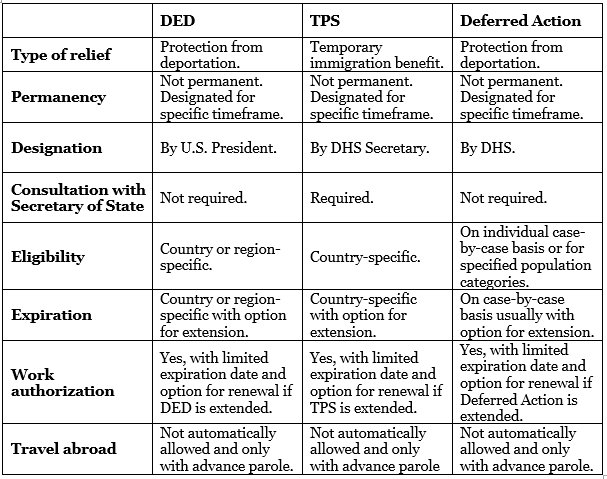 By Mary Tolentino, Woodson Martin Democracy Fellow (JMU ‘23, Health Sciences & Medical Spanish)
By Mary Tolentino, Woodson Martin Democracy Fellow (JMU ‘23, Health Sciences & Medical Spanish)
Deferred Enforced Departure (DED) is a form of relief from removal for certain individuals from countries and regions experiencing political or civil conflict or natural disasters. DED only provides temporary protection from deportation and is not a path to citizenship or other residential status. Individuals who receive DED are eligible to work in the United States but cannot travel abroad without parole and must file and be approved for parole in order to travel abroad.
The president of the United States designates which countries or regions are eligible for DED protection. The President of the United States has the discretion to designate countries or regions for DED as part of the president’s power to conduct foreign relations. The president generally grants DED, which has no statutory basis, by issuing a presidential directive through an executive order or presidential memorandum.
There are some key differences between Deferred Enforced Departure, Temporary Protected Status (TPS) and deferred action. The National Immigration Forum created this useful table to explain differences and different government entities involved.
 Just before leaving office, President Donald Trump used DED to offer temporary legal status to Venezuelans fleeing the humanitarian crisis brought on by Nicolás Maduro’s regime. On January 20, President Biden began his term with executive orders addressing DED for Liberians. Here is what you need to know.
Just before leaving office, President Donald Trump used DED to offer temporary legal status to Venezuelans fleeing the humanitarian crisis brought on by Nicolás Maduro’s regime. On January 20, President Biden began his term with executive orders addressing DED for Liberians. Here is what you need to know.
DED for Liberians
Liberians were originally granted Temporary Protected Status (TPS) protection due to the armed conflict and civil strife that affected the region from 1991 until 2003. When the TPS protection for Liberians ran out in October 2007, President Bush deferred the enforced departure. President Obama subsequently extended DED protections for Liberians until March 2018 and later President Trump extended protections until March 2020 to allow an orderly transition period for Liberian DED beneficiaries. In 2019, Congress enacted the Liberian Refugee Immigration Fairness (LRIF) provision which would make Liberians who were continuously present in the United States since November 20, 2014 eligible to become lawful permanent residents. President Trump extended the DED transition period through January 10, 2021 to ensure that DED beneficiaries continue to be eligible for employment.
President Biden has decided to defer removal proceedings through June 20, 2022 for Liberians who were present in the U.S. and were under a grant of DED as of January 10, 2021. The executive order also ensures that Liberians with DED should have continued employment authorization through June 30, 2022.
Process for Applying
According to USCIS, LRIF provides the opportunity for Liberian nationals and spouses, unmarried children under 21 years old, unmarried sons and daughters 21 years old or older living in the United States who meet eligibility requirements to obtain lawful permanent resident status, or to receive green cards. The necessary documents include:
- Complete and file Form I-485, the application to register permanent residence or adjust status by the month of December of the year 2021.
- Be from the nation of Liberia.
- Have lived in the United states from the period of November 20, 2014 until the date of filing for the Form I-485.
- For employment authorization, the Form I-765, Application for Employment Authorization.
DED for Venezuelans
President Trump issued an executive order granting DED and work authorization to Venezuelans for the first time in January 2021. To qualify for DED, you must be a Venezuelan who was residing in the United States on January 20, 2021. It’s also essential that beneficiaries have not returned to Venezuela, have not been previously deported, and do not have a felony conviction or two or more misdemeanor convictions. USCIS has not announced the implementation method for DED for Venezuelans and more information is expected to follow.
Looking Ahead
While DED grants deportation relief to thousands, it does not necessarily offer a pathway to citizenship. It is essential to see how the Biden administration continues its fight for immigration reform through executive action while Congress works on longer-term and more permanent changes through the legislative process.
DISCUSSION QUESTIONS
- Why and how does the president have authority to grant Deferred Enforced Departure? What are the implications of presidents having this power versus Congress?
- What are differences between Deferred Enforced Departure, Temporary Protected Status (TPS) and deferred action?
- How might the administration of Deferred Enforced Departure affect those who are recipients of the program?
- What can be done to ensure more permanent citizenship solutions for individuals from countries and regions experiencing political or civil conflict or natural disasters?
MORE RESOURCES
- National Immigration Forum Fact Sheet: Deferred Enforced Departure (DED)
- U.S. Citizenship Act of 2021: A Breakdown
- Pew Research Center, Key Findings About U.S. Immigrants
- Gallup, Immigration
- Pew Research Center, Americans broadly support legal status for immigrants brought to the U.S. illegally as children
- American Immigration Council
- Democracy Matters, Ep. 49, From Chaos to Compassion

Recent Comments